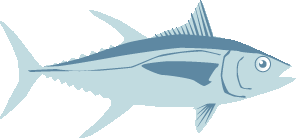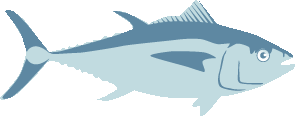Overview
The FFSAPI-SARGEN HANDLINE FIP is a 5-year multi-stakeholder project aimed at ensuring the sustainability of the yellowfin and bigeye tuna handline fisheries in the Philippines Fisheries Management Areas 2 and 3 which is managed by the Western and Central Pacific Fisheries Commission. The project does not only address environmental aspects of the fisheries but the social aspects as well. With improvements in the fisheries, the fisheries will attempt to secure eco-label certifications like Marine Stewardship Council to demonstrate the strong commitment to advancing fisheries sustainability.
The project currently involves 88 handline vessels from 7 municipal operators (with boats 3 GT and below) and 21 commercial operators (with vessels over 3GT to 72 GT). These handliners from Sargen Fish Port Tuna Handline Fishing Association Inc. (SARGEN HANDLINE) supply the fish raw material requirements of the members of the Fresh Frozen Seafood Association of the Philippines, Inc. (FFSAPI).
How is this FIP Doing?
| 46% | 29% | 25% |
| 9% |
| Behind | On Track | Complete | Future |
|---|---|---|---|
| 0% | 82% | 9% | 9% |
| Behind | On Track | Complete | Future |
|---|---|---|---|
| 0% | 100% | 0% | 0% |
-
To support the formulation and adoption of science-based harvest strategies and control rules for tuna species
Monitor and actively engage in lobbying efforts with the Western and Central Pacific Fisheries Commission (WCPFC) to promote the establishment of target reference points and harvest control rules for yellowfin and bigeye tunas by December 2027. -
To improve data collection systems for primary, secondary, and associated species in the fishery
Ensure the ongoing collection of verifiable and traceable catch data for all key species groups (primary, secondary, ETP, and associated species) by December 2027. -
To strengthen species-specific and bycatch management practices
Implement and enhance management strategies, including bycatch reduction and baitfish stock assessment, to support responsible fishing practices by December 2027. -
To establish effective monitoring and information systems across all species groups
Develop and operationalize monitoring mechanisms to support species assessment and adaptive management strategies, running til December 2027. -
To ensure the protection of endangered, threatened, and protected (ETP) species through targeted management actions
Apply ETP species management frameworks and integrate protective measures into catch data systems and fishery practices by September 2026. -
To enhance the sustainable management and monitoring of fish habitats
Implement management strategies and improve information systems related to fish habitats and Fish Aggregating Device (FAD) use between by March 2026. -
To adopt an ecosystem-based approach in fisheries management
Utilize FAD management and ecosystem modeling tools to inform decision-making and ecosystem assessments by December 2027. -
To institutionalize the National Tuna Management Plan and strengthen governance frameworks
Support the adoption, implementation, and review of the National Tuna Management Plan while increasing participation in consultative processes until December 2027. -
To enhance fisheries compliance and enforcement capacity
Build enforcement capacities and implement effective monitoring of compliance-related activities by November 2027. -
To evaluate the performance of fisheries management systems through regular monitoring
Monitor and assess the implementation of the Tuna Management Plan and enforcement activities to ensure continuous improvement from July 2023 to September 2027.

